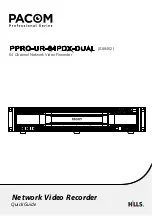
62
Chapter 5: Configuring Device Security
Defining Access Control
SFE1000P Gigabit Ethernet Switch Reference Guide
Chapter
5
•
ICMP Code
— Indicates and ICMP message code for filtering ICMP packets. ICMP packets
that are filtered by ICMP message type can also be filtered by the ICMP message code.
•
IGMP
— Filters packets by IGMP message or message types.
•
Source
Address
–
IP Address
— Matches the source port IP address from which packets are addressed to
the ACE.
–
Mask
— Defines the source IP address wildcard mask. Wildcard masks specify which
bits are used and which bits are ignored. A wild card mask of 255.255.255.255
indicates that no bit is important. A wildcard of 0.0.0.0 indicates that all the bits are
important. For example, if the source IP address 149.36.184.198 and the wildcard
mask is 255.36.184.00, the first eight bits of the IP address are ignored, while the last
eight bits are used.
•
Best.
Address
–
IP Address
— Matches the destination port IP address to which packets are addressed to
the ACE.
–
Mask
— Defines the destination IP address wildcard mask.
Select either
Match DSCP
or
Match IP.
•
Match DSCP
— Matches the packet to the DSCP tag value.
•
Match IP Precedence
— Matches the packet IP Precedence value to the ACE. Either the
DSCP value or the IP Precedence value is used to match packets to ACLs. The possible field
range is 0-7.
•
Action
— Indicates the action assigned to the packet matching the ACL. Packets are
forwarded or dropped. In addition, the port can be shut down, a trap can be sent to the
network administrator, or packet is assigned rate limiting restrictions for forwarding. The
options are as follows:
–
Permit
— Forwards packets which meet the ACL criteria.
–
Deny
— Drops packets which meet the ACL criteria.
–
Shutdown
— Drops packet that meets the ACL criteria, and disables the port to which
the packet was addressed. Ports are reactivated from the
Port Management
page.
















































